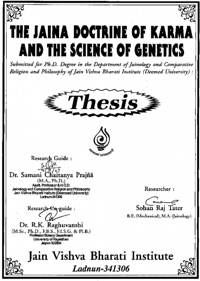Why are some people in more favourable situations than others? Why are some rich, while others struggle? Why do some suffer more sickness than others? Why is science unable to explain all of these questions? The answer to such disparity lies in the understanding of puṇya and pāpa. What are puṇya and pāpa? Puṇya is earned when our activities are good while pāpa is earned when our activities are bad. When puṇya matures (rise of karma) or gives its result (fruition) it brings happiness and comfort and when pāpa matures (rise of karma) or gives its result (fruition), it brings nothing but suffering.
Now it is obvious that what we see in the world is nothing other than the result of our past actions. Knowing this will remind us that our activities should be wholesome if we want happiness and comfort in life, otherwise we should be ready to accept unhappiness as well as discomfort. When speaking about activities people mostly think of physical activities, but we should not forget that what we express verbally as well as what we think mentally, are also considered activities. For this reason, not only our physical activities should be welsome, but out speech and thoughts should also be pure. We should remember, that not only we accumulate puṇya and pāpa from our actions, but also from asking someone else to do something for us or from encouraging someone else to do something. Lord Mahāvīra's message is "Live and let other live". Everybody desires to live and enjoy the comforts of life. Therefore, we should not come in the way of anyone seeking the same. If we can properly understand the implications of this message, it will go long way in moulding our attitude. Around us we see and hear that many people hunt or fish, they eat meat, chicken, fish, eggs etc. Some people argue that while eating meat we ourselves are not killing so it should not effect us. However they do not realize that by eating meat, even though they are not directly killing animal, birds, fishes etc. they are instrumental in killing. The more they eat the more killing there will be. Just like us, those animals also want to live. We should remember that not only do our actions bring karmas, but even our actions which are indirectly or directly the cause of other actions also bring karmas to us.
People also use harsh word against each other and plan destruction. Unfortunately, because some karmas do not produce their results immediately, people do not care what may happen in the future, but these actions also produce karmas.
We also hear about riots in which people plunder, hind and/or kill other and set fire to shops, homes and other buildings. By doing so they put a lot of people through unnecessary suffering. These people understanding such heinous activities may think that they are getting even. However, they fail to realize that by causing suffering to others they themselves will have to suffer the consequences of their evil acts at some point, if not in this life, then in coming lives.
Consequently our objective should be not to disturb the comforts of other beings hurting them in any way, and killing or being in any way instrumental in taking their lives. By providing comfort and security to others we can gain good karmas also known as puṇya. Puṇya brings forth happiness in this life or our coming lives. On the other hand, if we cause suffering or unhappiness to others then, we have committed a sin and we acquire bad karmas also known as pāpa, such pāpa brings forth unhappiness in this or future lives.
Jaina scriptures describe that even though puṇya or pāpa, on surface, may look as if their only effect is to cause comfort or discomfort, there is more to it.
Puṇya is sub divided into two categories:
1. Puṇyānubandhī puṇya, 2. Pāpānubandhī puṇya.Pāpa is sub divided into two categories:
3.Pāpānubandhī pāpa, 4. Puṇyānubandhī pāpa.[8]Brief definition of above four is as follow:
- Puṇyānubandhī puṇya
Puṇya which we accumulate now will bring us comforts and leads to a life where we will accumulate puṇya again.- Pāpānubandhī puṇya
Puṇya which we accumulate now, also will bring us comforts, and leads to a life where we will accumulate pāpa instead of puṇya.- Pāpānubandhī pāpa
Pāpa which we accumulate now will bring us discomforts, and leads to a life where will accumulate pāpa again.- Puṇyānubandhī pāpa
Pāpa which we accumulate now will bring us discomforts but leads to a life where we will accumulate puṇya instead of pāpa.
Puṇya and Pāpa
Footnotes
 Prof. Dr. Sohan Raj Tater
Prof. Dr. Sohan Raj Tater
 Doctoral Thesis, JVBU
Doctoral Thesis, JVBU